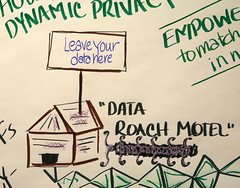Yesterday's update of iTunes added Ping, a music-focused social network. When I tried it out early in the evening, it had Facebook Connect enabled, and both imported friends from Facebook, and notified me when new ones joined. Shortly afterwards, Mark Zuckerberg joined, and shortly after that the Facebook connection was missing.
This morning, neither company is talking on the record, though Kara Swisher reports that Steve Jobs complained about 'onerous terms' from Facebook.
 This naturally reminds me of the problems we had with Google Friend Connect, where Facebook's accusation of a ToS violation was never backed up by an explanation of what would not violate the terms, leading to the "Data Roach Motel" accusations at Supernova. The underlying issue is whether you should give another company veto power over your application. Last time I wrote on this, it was Apple's veto I was warning about, though at the same time Apple was trying to avoid giving Adobe veto power over their platform again.
This naturally reminds me of the problems we had with Google Friend Connect, where Facebook's accusation of a ToS violation was never backed up by an explanation of what would not violate the terms, leading to the "Data Roach Motel" accusations at Supernova. The underlying issue is whether you should give another company veto power over your application. Last time I wrote on this, it was Apple's veto I was warning about, though at the same time Apple was trying to avoid giving Adobe veto power over their platform again.
The thing is, we have been round this cycle before, and the answer is known too - the way to interoperate with another company without having to have a business agreement with them is to use open standards, not proprietary APIs.
Apple knows this - they have helped lead development of HTML5 and WebKit, along with many other standards in the past, including podcasting and MPEG4. Facebook knows this too, and they have been strong supporters of OAuth and Activity Streams, and even of Portable Contacts, when it's them doing the importing.
Clearly it good for us as users to be able to delegate our contact lists to an existing source - this weeks launch of conference sharing site Lanyrd shows that. It's also in our interests to be able to propagate the actions of playing, liking and purchasing music, videos and anything else between sites of our choosing, so that we can share with our friends, and so we can get more useful recommendations for the future (at minimum, not suggesting things we already have).
This was the core of the discussion at the VRM Workshop last week in Boston - that we should control over who sees what about us, and I think that with these common standards we can solve both problems - the individuals get to save having to re-enter their information everywhere, and control what flows to where, and the companies get the ability to interoperate without bizdev and single source lock-in. Activity Streams (and the associated standards they build on) are our best hope for this.



9 comments:
Alec Muffett: mentioned this in I would almost agree with you, except that in order for it to work, we would have to invent DRM that also works. :-/ Kevin Marks Kevin Marks Ian Brown Eva Blum-Dumontet 🦝 Alex Stamos Eric Kind Floor Kevin Marks Oxford Internet Institute Privacy International.
via twitter.com
Bertil Hatt: mentioned this in You shouldn’t think of Facebook as a single consistent entity but as a lot of internal moral & ethical debates, with people arguing passionately on both sides of every argument that you can imagine. Which sides win? Like the two wolves story, the one you feed. Kevin Marks Kevin M....
via twitter.com
Floor: mentioned this in I'll grant you there will probably be lots of grey area. But will you agree that there probably are categories of data where that grey area is not relevant and Facebook still refuses access? Like the two categories I mentioned in the beginning. Kevin Marks Kevin Marks Ian Brown ....
via twitter.com
Alec Muffett: mentioned this in That position is fair, at least. Still a massive issue that not all data that is attributable to a user is definitely ABOUT that user, and that shared data exists and complicates matters. Elsewhere, this is the same issues as police raids because IP Addresses != Houses Addresses ....
via twitter.com
Floor: mentioned this in This is why I'm uneasy about article 20 data portability, but shouldn't be relevant for basic article 15 access rights. But this exact issue is part of the reason I want article 15 access to logs of way back if they exist. Kevin Marks Kevin Marks Ian Brown Alec Muffett Eva Blum-....
via twitter.com
Floor: mentioned this in Let's start with an easy category; custom audiences. Facebook has to know what specific custom audience I'm in because that's the information that's needed to display the advertisements to me. Kevin Marks Kevin Marks Ian Brown Alec Muffett Eva Blum-Dumontet 🦝 Alex Stamos Eric Ki....
via twitter.com
Alec Muffett: mentioned this in Well, yes; because if you provide APIs for people to access the data and share it and mash it up with third party apps, then Cambridge Analytica happen, and the other half of civil society gets upset. Kevin Marks Kevin Marks Ian Brown Eva Blum-Dumontet 🦝 Alex Stamos Eric Kind Fl....
via twitter.com
Alec Muffett: mentioned this in I am not competent to speak about what it's like now, nor what is "available" now, but on the basis of past experience, some of the information you allude to is not personally identifiable in a 1:1 manner of personal identifiers. Kevin Marks Kevin Marks Ian Brown Eva Blum-Dumont....
via twitter.com
Kevin Marks: mentioned this in Time to bring back Capability models and feeds? Ian Brown Alec Muffett Eva Blum-Dumontet 🦝 Alex Stamos Eric Kind Floor Oxford Internet Institute Privacy International.
via twitter.com
Post a Comment